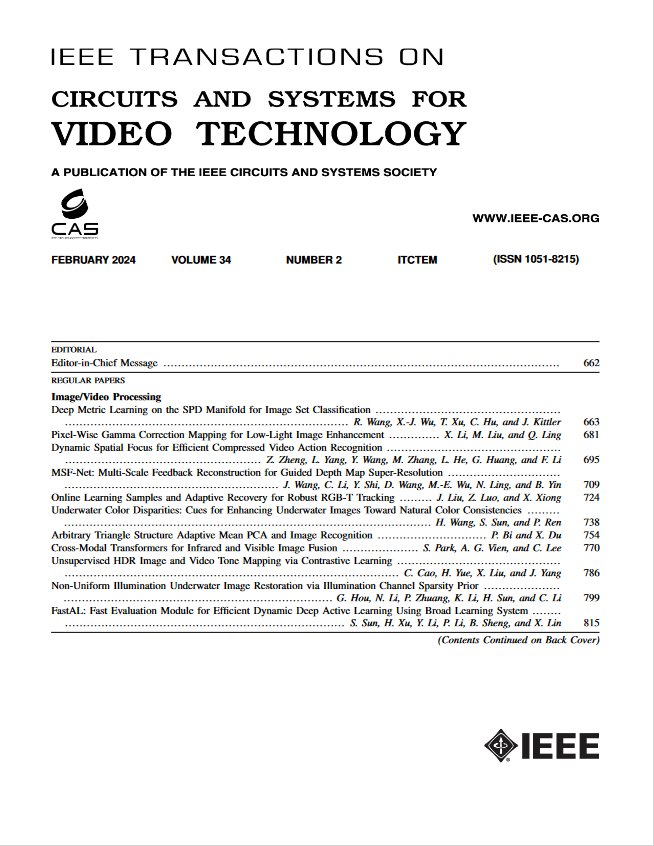A Unified Open Adapter for Open-World Noisy Label Learning: Data-Centric and Learning-Based Insights
IF 11.1
1区 工程技术
Q1 ENGINEERING, ELECTRICAL & ELECTRONIC
IEEE Transactions on Circuits and Systems for Video Technology
Pub Date : 2025-03-13
DOI:10.1109/TCSVT.2025.3550899
引用次数: 0
Abstract
Noisy label learning (NLL) in open-world scenarios poses a novel challenge due to the presence of noisy data from both known and unknown classes. Most existing methods operate under the closed-set assumption, rendering them vulnerable to open-set noise, which significantly degrades their performance. While some approaches attempt to mitigate the impact of open-set examples, they struggle to learn effective discriminative representations for them, leading to unsatisfactory recognition performance. To address these issues, we propose a unified Open Adapter (OpenAda) that identifies open-set noise from both data-centric and learning-based perspectives, and can be easily integrated into mainstream NLL methods to improve their performance and robustness. Specifically, the data-centric part leverages label clusterability to sequentially identify basic clean and basic open-set examples both with high neighbor agreement. The learning-based part integrates one-vs-all classifiers with a progressive open disambiguation strategy to learn a reliable “inlier vs. outlier” boundary for each class. This enables the model to detect challenging open-set examples that partially overlap in the representation space with closed-set ones. Extensive experiments on synthetic and real-world datasets validate the superiority of our approach. Notably, with minor modifications, DivideMix with OpenAda achieves performance improvements of 9.31% and 18.26% on the open-world CIFAR-80 dataset under 80% symmetric noise and 40% asymmetric noise. The code is available at开放世界噪声标签学习的统一开放适配器:以数据为中心和基于学习的见解
由于来自已知和未知类别的噪声数据的存在,开放世界场景中的噪声标签学习(NLL)提出了一个新的挑战。现有的大多数方法都是在闭集假设下工作的,容易受到开集噪声的影响,从而大大降低了算法的性能。虽然一些方法试图减轻开放集示例的影响,但它们很难为它们学习有效的判别表示,导致识别性能不令人满意。为了解决这些问题,我们提出了一个统一的开放适配器(OpenAda),它可以从以数据为中心和基于学习的角度识别开放集噪声,并且可以很容易地集成到主流NLL方法中,以提高它们的性能和鲁棒性。具体来说,以数据为中心的部分利用标签聚类性依次识别具有高邻居一致性的基本干净和基本开集示例。基于学习的部分将一对全分类器与渐进式开放消歧策略集成在一起,为每个类学习可靠的“内值与离群值”边界。这使模型能够检测具有挑战性的开集示例,这些示例在表示空间中与闭集示例部分重叠。在合成数据集和真实世界数据集上进行的大量实验验证了我们方法的优越性。值得注意的是,在开放世界的CIFAR-80数据集上,在80%的对称噪声和40%的非对称噪声下,使用OpenAda的DivideMix经过轻微的修改,性能提升了9.31%和18.26%。代码可在https://github.com/chenchenzong/OpenAda上获得。
本文章由计算机程序翻译,如有差异,请以英文原文为准。
求助全文
约1分钟内获得全文
求助全文
来源期刊
CiteScore
13.80
自引率
27.40%
发文量
660
审稿时长
5 months
期刊介绍:
The IEEE Transactions on Circuits and Systems for Video Technology (TCSVT) is dedicated to covering all aspects of video technologies from a circuits and systems perspective. We encourage submissions of general, theoretical, and application-oriented papers related to image and video acquisition, representation, presentation, and display. Additionally, we welcome contributions in areas such as processing, filtering, and transforms; analysis and synthesis; learning and understanding; compression, transmission, communication, and networking; as well as storage, retrieval, indexing, and search. Furthermore, papers focusing on hardware and software design and implementation are highly valued. Join us in advancing the field of video technology through innovative research and insights.

 求助内容:
求助内容: 应助结果提醒方式:
应助结果提醒方式:


